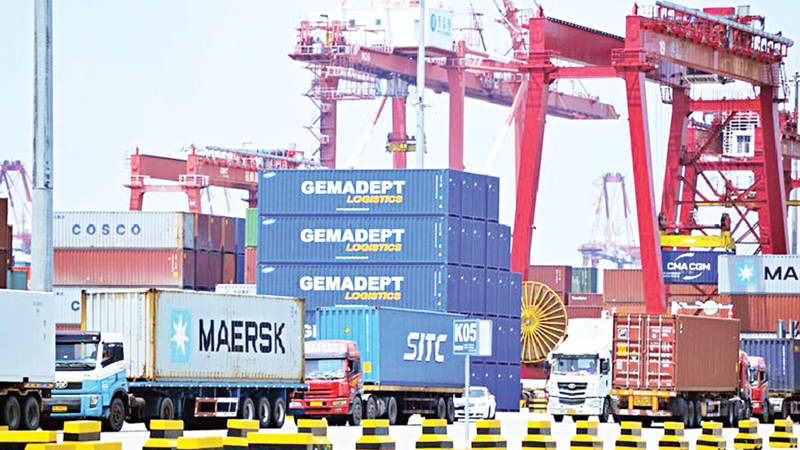BEIJING: China’s exports and imports plummeted much more than expected in February, official data showed , adding to worries about slowing growth in the world’s number two economy as it fights a trade war with the US.
Its politically sensitive trade surplus with the US narrowed to USD 14.7 billion for the month from USD 27.3 billion in January, the data from China’s customs administration issued on March 8 showed.
China’s total overseas shipments sank 20.7 per cent on-year and imports fell 5.2 per cent, much worse than the 5.0 per cent and 0.6 per cent drops forecast in a Bloomberg News poll.
“Today’s trade figures reinforce our view that China’s trade recession has started to emerge,” said Raymond Yeung of ANZ bank in a note.
“Looking ahead, we find little reason to expect a rebound in the near term on the back of a sluggish global electronics cycle,” said Yeung, adding it would weigh on China’s first quarter GDP growth.
Recent economic data point to the difficulties China faces with growth in the last three months of 2018 clocking in at 6.4 per cent.
In January, an important barometer of prices in the country’s industrial sector neared contraction territory while manufacturing activity saw its worst performance in three years in February.
China’s Premier on March 5 laid out a lower growth target of 6.0 to 6.5 per cent this year in a report to the country’s annual parliamentary session held in Beijing, down from 6.6 per cent growth in 2018.
The government outlined major tax cuts, fee reductions and looser monetary policy to combat the slowdown.
Worries have grown about slowing global growth with the European Central Bank slashing its 2019 eurozone growth and inflation forecasts on March 7, citing “uncertainties” around geopolitical risks and trade rows.
However, analysts caution it is difficult to compare trends in China’s data at the start of the year due to the Chinese New Year holiday, which came in early February this year and can affect business activity.
China’s exports for the first two months fell 4.7 per cent, and imports were down 3.1 per cent, estimated Yeung of ANZ.
An end to the months-long US-China trade dispute would help China’s hurting exporters – shipments to the US fell about 29 per cent last month.
Washington and Beijing last year exchanged punitive tariffs on more than $360 billion in two-way trade but have recently indicated they are close to coming to terms.
America’s trade deficit with China hit a record $419.2 billion last year, US data showed. China put its surplus at a lower but still record $323.3 billion.
Exports of soybeans, a crucial crop across vast expanses of the US, fell 18 per cent for the year as the tit-for-tat tariffs sent Chinese buyers elsewhere.
US President Donald Trump said on March 7 negotiations were making progress, telling reporters at the White House that the talks were “moving along pretty well”.
Chinese Foreign Minister Wang Yi noted on March 8 that the two sides had made “significant progress” recently and blasted hawks in Washington who have advocated a “decoupling” between the two countries’ economies.
“To decouple from China is to decouple from opportunities, decouple from the future, and in a sense, to decouple from the world,” Wang said at a news conference in Beijing.
Earlier, Commerce Minister Zhong Shan told reporters “there is still lots left to do” in trade negotiations.
In a move that could help the negotiations, China’s parliament will next week pass a new law regulating foreign investment and barring the forced transfer of technology by foreign firms to Chinese joint venture partners. AFP







